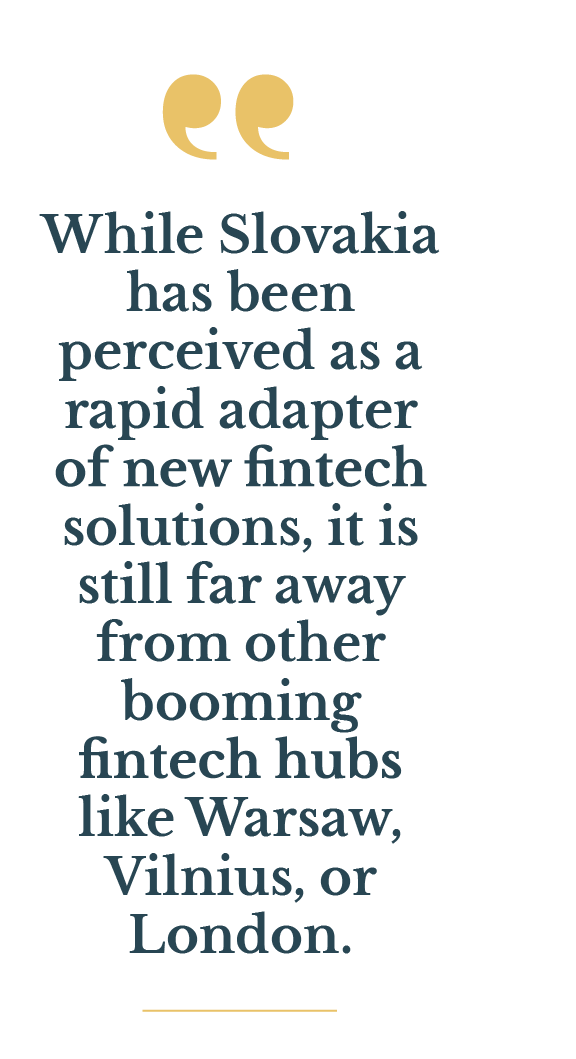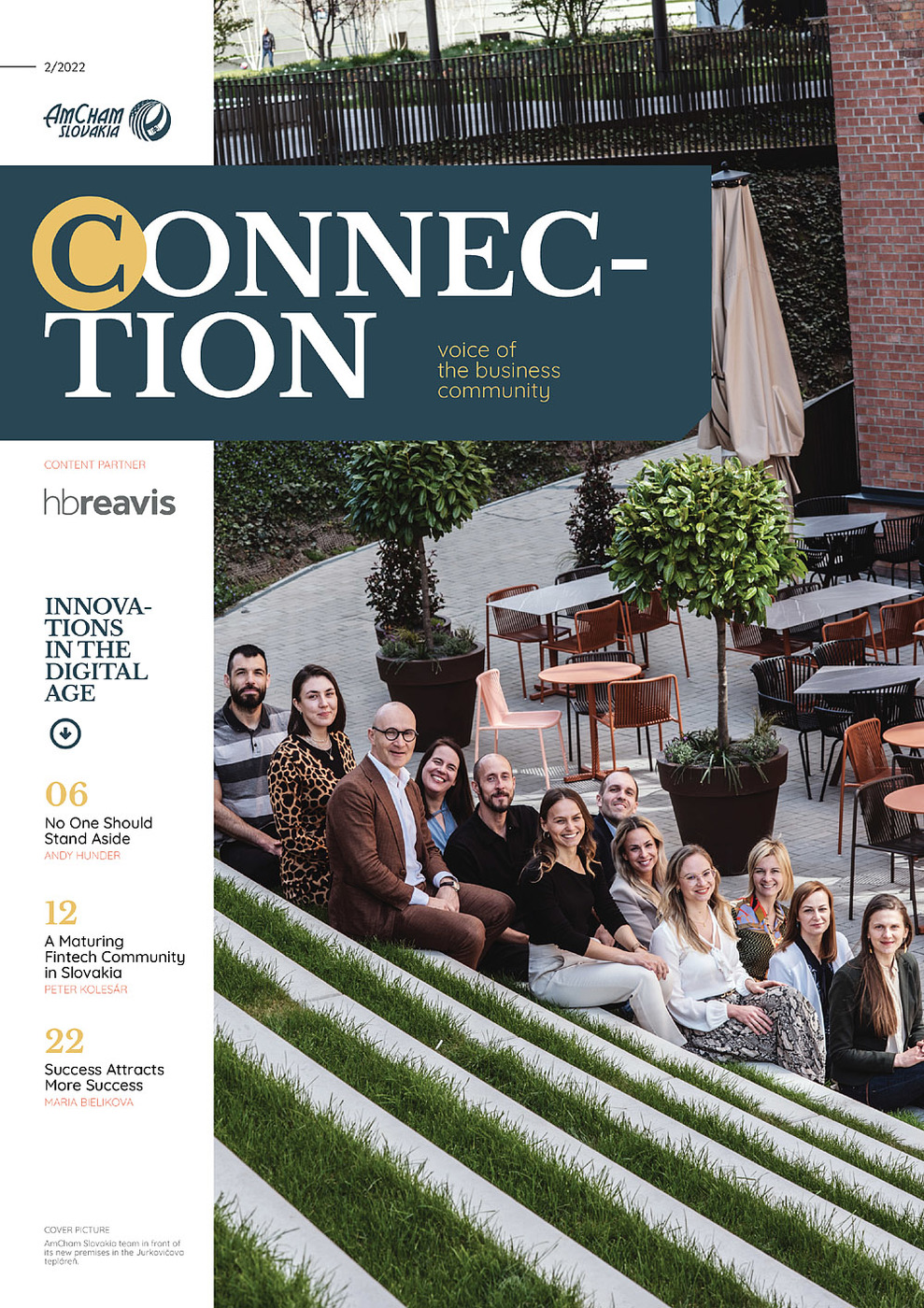RAPID ADOPTER BUT SLOWER TO INNOVATE
While Slovakia has been perceived as a rapid adapter of new fintech solutions, it is still far away from other booming fintech hubs like Warsaw, Vilnius, or London. One of the key reasons for this is the lack of a more robust ecosystem around fintech. Slovak banks, most of which are branches of international mother companies, are only gradually opening and becoming technologically ready to collaborate with the external world of startups and entrepreneurs. However, some banks like Tatra banka have embraced innovation as a key differentiator and competitive advantage, paving the way with flagship startup programs like Elevator Lab.
Public institutions have shown interest in supporting fintech innovators, but these efforts are often not balanced with adequate resources. If Slovakia wants to narrow the gap with countries like the UK, France, Lithuania, or Estonia, it will need to take several steps to support the growing fintech Innovation Community in Slovakia. While most critical banking institutions have their headquarters in Bratislava, there is a real opportunity for linkage with other cities – for instance, Košice, where much of Slovakia’s IT talent resides.
Building a fintech startup is a challenging journey, and new ventures need to think globally and quickly move to the international market to survive and thrive. Therefore, the fintech innovation community will require more projects like technical sandboxes, where startups can develop new solutions in direct collaboration with banks. And most of all, members of the fintech community will need to establish stronger ties with each other that will allow them to pull in the same direction.
 A WAVE OF DISRUPTION ACROSS THE FINTECH LANDSCAPE
A WAVE OF DISRUPTION ACROSS THE FINTECH LANDSCAPE
The traditionally conservative financial sector has undergone many dramatic changes in the last decade, but the revolution has yet to arrive. An industry that used to be characterized by a few dominant players is being shaken up by open banking, cryptocurrencies, digital-only banks, blockchain, and other tech-related ventures.
Early fintech startups as PayPal and Bitcoin left a significant mark on the fintech landscape, while the impact of others such as Stripe and Chime is just being realized. Revolut, the UK based digital bank, has reached 12 million users in only five years since its establishment.
Startups are not the only ones that would like to ride on the wave of fintech transformation. Financial institutions have now taken up the mantra of “Innovate or Die” that has driven tech companies for years. These companies are launching new initiatives to cooperate with startups or develop new ideas on their own.
Many institutions claim to disrupt themselves. Regardless of the market shift, fintech remains a highly regulated industry. While more flexible, startups often lack the necessary resources and data needed to test their solutions in an operational environment. These circumstances create a vital demand for more collaboration between emerging and established players.
EC REGULATORY SHIFT THAT ENABLED CHANGE
While regulations are often known to be one of the most significant innovation barriers, the EU had the vision to turn them into a change catalyst. In October 2015, the European Commission issued a new directive, the Payment Services Directive 2 (PSD2), intended to open the banking sector. Until the implementation of PSD2, third party integrators faced multiple obstacles accessing consumer data from banks.
The goal of the directive was to increase competition by attracting new players and supporting the development of new services by established actors. In the end, consumers would be the primary winners through increased competition, satisfaction, experience, and security. Yet even though the new directive is lifting some of the legal burdens, financial sector legislation remains complex and often complicated.
The critics of PSD2 say that it missed the mark, and competition is still stifled by the regulations. Each member state was responsible for implementing the directive in their country, and some governments dealt with it more successfully than others. The same can be said on the micro-level. To successfully implement PSD2 and accelerate newcomers’ potential, banks had to prepare their systems for the transformation which required significant efforts and resources, and some banks are technologically still not ready to open up.
SLOVAKIA IS A FAST ADOPTER
Slovakia is internationally perceived as a rapid adopter of fintech solutions on several fronts. In comparison to other EU countries, Slovakia ranked above average in contactless payments (in 2014, it was 64% in Slovakia vs. an average of 15% across the EU), and almost 85 % of Slovakia’s population has an account in a financial institution.
Slovakia is recognized as a good testing ground for new financial solutions, and many banks frequently use Slovakia’s competitive environment to test or pilot experimental projects on a smaller scale.
In the last few years, it has become clear that Slovaks are more than capable innovators. Tatra banka (Raiffeisen) was recognized as the most innovative digital bank in the CEE region, and Poštová Banka has successfully launched its challenger bank – 365.bank.
It is not just banks that aim to move the boundaries of the fintech sector from Slovakia. Vacuumlabs became a trusted partner developing software and technological solutions for global players in the financial world. The company has also launched some ground-breaking ventures of its own – like the US digital bank designed explicitly for the LGBT+ community. Payout became the only Slovak company that received the license for payment services under the PSD2. Yet, Slovakia still waits for a truly global success story in fintech.
BUILDING A MORE VIBRANT FINTECH COMMUNITY
In such a regulated financial sector, startups often depend on effective public institutions and collaboration with large financial institutions. National Bank of Slovakia (NBS) reacted quickly to the European Commission’s request and implemented the PSD2 directive, and the same can be said about the Ministry of Finance.
Both institutions went the extra mile and launched their initiatives to support the fintech innovation community. Fintech Hub by NBS was created to simplify the regulatory jungle for startups. The Ministry of Finance runs its Center for Financial Innovation to identify barriers that slow down or impede innovation. While public institutions express their intention to support innovation, resources are insufficient. Because of a lack of funds, governmental bodies cannot effectively support the financial sector’s transformation. Some banks and insurance companies have stepped up to drive the growth of the fintech innovation community.
 Tatra banka regularly organizes acceleration activities, hackathons, events and collaborates with startups operating in the sector. However, such initiatives are often isolated and do not lead to closer ties in the ecosystem. The Slovak Fintech Association has been trying to unite the fintech community and create the bedrock for future fintech unicorns. The Association also strives to facilitate a wider discussion with governmental and non-governmental institutions to identify meaningful steps that could support the growth and uptake of early-stage fintech ventures in Slovakia.
Tatra banka regularly organizes acceleration activities, hackathons, events and collaborates with startups operating in the sector. However, such initiatives are often isolated and do not lead to closer ties in the ecosystem. The Slovak Fintech Association has been trying to unite the fintech community and create the bedrock for future fintech unicorns. The Association also strives to facilitate a wider discussion with governmental and non-governmental institutions to identify meaningful steps that could support the growth and uptake of early-stage fintech ventures in Slovakia.
The fintech sector is almost solely concentrated around the capital city, Bratislava, which is positive for ecosystem building, but the sector lacks access to specialized venture capital and investors. Furthermore, the absence of technological sandboxes that accelerate the validation of new ideas against the backdrop of a highly regulated environment slows down innovation and sector growth.
CONCLUSION
The fintech community in Slovakia benefits greatly from the level of effort and enthusiasm of its members. Slovakia has a strong potential to turn the fintech ecosystem into a real driver of economic growth. However, achieving that vision requires a unified and substantial commitment from multiple stakeholders.
- Public authorities need to step up the game
On the positive side, governmental institutions showed various efforts to implement PSD2 and help with fintech innovations. Yet, more financial support is needed. It is also worth considering whether the current regulatory structure is positioned to optimize opportunities or whether new structures should be considered. As seen in the UK case, a separate institution with a clear goal to support innovation in the financial sector can lead to outstanding results.
- Unite behind the same goal
Activities in the fintech community happen quite independently. Members of the ecosystem need to develop stronger ties that will allow them to pull in the same direction. More collaboration between initiatives and projects should be welcomed. It could benefit all stakeholders and send a more unified signal to policymakers about this innovation community’s growing potential.
- Support is needed for international expansion
Building a fintech startup is an expensive endeavor. Startups often need at least one or two years of development to reach the validation phase, mostly just a beginning. New ventures need to think globally and get to the international market fast to sustain themselves. Furthermore, the EU market is still quite diverse and challenging. Startups from such a small market as Slovakia will need more market knowledge and mentorship to overcome initial barriers and build new networks.
- Banks must prepare for the transformation
PSD2 caught most of the banks unprepared. Financial institutions are not technologically ready to utilize the potential of collaboration with third parties. Advancing the innovation and entrepreneurial mindset among bank employees is also crucial. Financial institutions will need to prepare for challenges that lie ahead and change their processes and structure.
- Creating the bedrock for startups
Slovakia will need to create an environment from which startups can grow organically. New ventures must have access to specialized venture capitalists that are willing to take a risk and provide some initial guidance. One of the critical components for the fintech community will be the accessibility of a technological sandbox that will help startups validate their ideas.
This text was originally published in “Slovakia: Regional Innovation Ecosystems of the Future: A Vision Beyond 2020”, a report prepared by CIVITTA and EIT Digital. The report advances the Slovak innovation ecosystem’s vision and strategy by promoting the most promising sectors and areas of innovation in the country. It maps and analyzes five emerging entrepreneurial and technology-driven sectors and communities. The full report can be accessed here: https://mailchi.mp/civitta/slovakia-regional-innovation-ecosystems-of-the-future
Peter Kolesár, Partner, Civitta Slovakia, a.s., and AmCham Board Member



Follow us